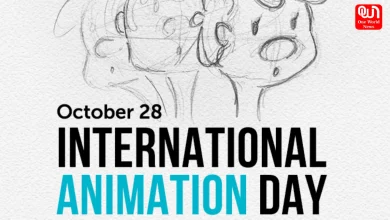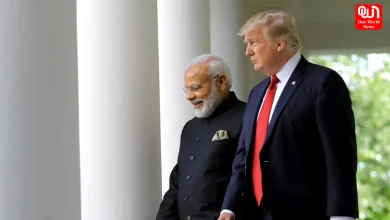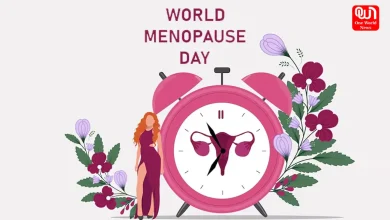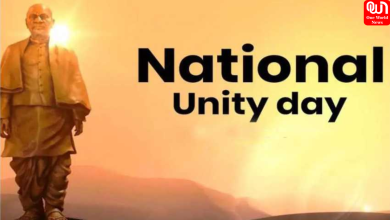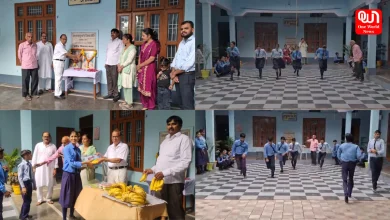Roobaroo: Face of Art
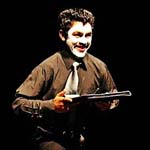
Roobaroo theatre group sets the right example for the saying that a thought can change anything if you wish to. Few students, who decided that come what may, they will continue worshiping this art form, started a theatre group all by themselves. Their passion and enthusiasm lead to the birth of ‘Roobaroo’.
Theatre is an art form where everything happens right in front of you, so keeping that in mind this name was decided which in itself means confrontation with everything people come across in their lives.
A.Kameshwari from One World News caught an opportunity to get herself ‘Roobaroo’ with the mind, body and soul of this theatre group, Sidhant Mago and Priyanka Kandpal.

Play: I killed Roy Mathily, Picture courtesy: Vinayak Verma
What was the idea behind forming Roobaroo?
Priyanka: I and few others had done extensive theatre during our graduation years and wanted to stay honest to this art form. Four years back, nearly 15-18 members were present in the first meeting of Roobaroo.
We began with a street play, for two main reasons- it was the most economical way to showcase our theatrical cravings and also because it has a higher reach amongst the masses. So, the first year began with a street-play and in the second year we tried to challenge ourselves even more with a non-verbal play that involved music, dance and mime. With this production, we traveled to Pune as well.
What inspires you?
Priyanka: During all these years, the sole inspiration has been the fact that we’re not only growing as a group but as individuals too. From acting in plays to directing, scripting, creating music, handling backstage, props, etc. each of us specializes in juggling with all these. Being one of the co-founders of the group, I have seen members joining-in and quitting, I have seen people considering this small-little imaginary space their extended family. I have seen them manage their tight schedules to come for the rehearsals. I have seen people quitting jobs to make sure the show goes on. We have been through a lot and the fact that we’re still as passionate as ever, that’s what keeps us inspired.

Play: Khusar Phusar, Picture courtesy: Abhinav Jairath
What were difficulties you faced while coming up with this group?
Priyanka: Some of our very talented members had to relocate to other cities. Some of them parted ways because of internal conflicts (which happens almost everywhere). This made us unstable a lot of times. Apart from this, initially finances were also bit of a problem. I remember the times, when we were doing our first street play ‘Bandi’ we had collected funds from within the group to buy good instruments. None of us was working and one of our members, Shashank Mehra, was a class XI student (now our most talented vocalist and percussionist) so, taking out a mere 500 per-person seemed like a big deal. But eventually, things improved and became more stable. Our very first source of income came from Atelier Theatre Group when they commissioned a play to us. The play was called ‘Khusar Phusar’ (Sidhant Mago’s Hindi adaptation of Neil Simon’s ‘Rumors’). It is among the Roobaroo’s very popular plays till date. .
Siddhant: Atul Kumar who is a renowned name in the world of theatre has taken an amazing step to tackle the biggest problem faced by theater i.e. ‘Space’. You can’t always work outside, especially not in summers. So, yes either a place to practice or space to perform, theatre is suffering with scarcity of both.

Play: Khusar Phusar, Picture courtesy: Abhinav Jairath
Describe the journey of getting theatre, the recognition of an art form?Priyanka: It was difficult but not impossible. Our aim has always been to make plays for non-theatrical audience. We aim to bring a day where people ask ‘What movie is releasing today? None! Okay so, someone tell me which play is going on?’ I don’t want to restrict my audience to only theatrical audience because then the art will not spread and would stay in between the four walls.
Sidhant: I think the reason behind the fact that theatre has not been seen as a famous art form is the personality of people who perform theatre. The moment few non-theatrical groups come-in to watch their play, they start shivering with the thought that how the audience will understand their brilliant concepts. It’s not wrong to follow some pre-defined form of art, but it is important to mould them in a way that it is perceivable for the audience who haven’t witnessed theatre earlier. So, when theatre would start doing this, people would start preferring theatre over cinemas. For example: Vishal Bharadwaj’s ‘Omkara’ is an excellent example of lifting an idea and molding it for the non-literary audience

Play: Cafestorea, 3 Janak Rd, Picture courtesy: Vinayak Verma
Which issues are usually talked about in your plays?
Sidhant: Our plays are not necessarily about some issues. A street play is ‘Truth-well-told’ and theatre allows us to add fiction. In theatre, stories are really important. We have enacted four theatre plays and another one would release soon.
‘What The?’ was our debut play. It was a non-verbal dance drama where we tackled with issue of frustrations of everyday life. Stylization is a form of theatre from which we got inspired and thought of this play.
Khusar-Phusar: This one was a Farcical Comedy play. It was adapted from Neil Simon’s ‘Rumour’. It has no message but was meant to give some laughter moments.
Café-storea: It was a period drama based on the time of 1949. It had five stories unknowingly connected to one another. The idea triggered from one of Ameen Sayani’s programs.
I killed Roy Mathily: The premise was interesting. It was based upon a suspense-comedy theme. There are four characters and one Father. These four people confess to a father that they have committed murder. The confusion and thrill starts when the father comes to know that each one of them is confessing about the same murder which they have committed in four different places and time. The story revolves around father’s point of few and this mystery.

Play: Cafestorea, 3 Janak Rd, Picture courtesy: Vinayak Verma
Why theatre? How do you think theatre can make a difference in the people’s thought process?
It’s an interesting question. The reason behind picking up theatre is precisely the fact that we’ve done it all our life. It stimulates the thinking process, develops an understanding, pushes us into criticizing things with rationality, helps us understand various view points and above all, it is an interesting medium to spread the message across. Theatre is not something that we create; it is the thing creates us in its course.
Theatre has the potential to help us think beyond the mundane. Everyone cannot afford to buy movie tickets, or watch television; theatre, in that case, comes handy. The medium of street plays, like I said earlier, is inexpensive and has a wider reach. A lot of Delhi University’s Theatre Groups are doing a good job there. With their catchy call songs, jingles and typical street lingo, they know exactly how to pull the crowd. These youngsters see you in the eye, point a finger at you and make you feel uncomfortable, that’s where the purpose of theatre as a medium of mass awareness gets solved.
What is it that differentiates Roobaroo from other theatre groups?
Priyanka: In Roobaroo, we don’t follow hierarchy in the very sense of it. There is no ‘leader’ whom everyone is following. We’re a group and we work as a group. Our stories are written by the group members and we do not pick up popular (read already written) scripts. When it comes to making a play, we don’t really bother about the amount of time that goes into its making because right from selecting a script to writing it; we make sure every member has a contribution to make. The reason behind this is the fact that you feel more connected to something that you’ve created on your own. In the group, everyone has a say and decisions are taken on the basis of mutual consent.
Our group discussions do not follow any ‘language codes’ and more often than not, they appear more like a war to others. So, that’s also one of the good things about our group. The discussions are healthy and we end up drafting the best of ideas during its course.

Play: What the?, Picture courtesy: Vinayak Verma
The group does not work for individual profits. Whatever profit we get from our productions, we put it back to the new production. That’s how we keep ourselves going. None of our members is here for a monetary motive; they’re here for the hunger for theatre. And that’s what fuels their determination and keeps the energy of the group going.
Another significant aspect of our plays is our music. We include right from traditional instruments like, ‘matka’ (Ghatakam), tabla, flute, harmonium to common ones like Guitar, Violin, Mouth organ in our plays; we have a team that knows how to lift the play with music. And our USP is that we create original music and play it live.
Tell us something about your next play?
Sidhant: The next play which is in the pipeline is tentatively titled, ‘Five plays in a briefcase’. It is going to be a series of 5-6 short plays revolving around the briefcase. At some places, briefcase is a medium; at some other it is just a connecting thread. All the stories are framed in such a way that the audience gets the best of all the genres- Humor, Mock-serious, Suspense, Love, etc.
The play is scheduled for July and these days we’re touching base with sponsors who might want to get involved and help us put up an excellent show.

Play: What the?, Picture courtesy: Vinayak Verma
Any message for our readers?
Priyanka: One of our workshops at a Delhi based school could not come to fruition because a lot of parents did not allow their children to be a part of the theatre workshop for they considered it to be a waste of time. So, this one definitely goes out to them. Theatre or any art form for that matter has the potential to transform you from within. Don’t think too much before indulging in it. Allow your children to become artists and let them experiment. They’ll start understanding things better, will develop a point of view and will become sensitive to issues. They’ll do wonders.
Sidhant: Read about us, read about every theatre group and other art form. It is necessary to promote art and culture. And yes, we don’t need any monetary help, but a lot of support, motivation, healthy criticism and space.
Have a news story, an interesting write-up or simply a suggestion? Write to us at info@oneworldnews.in

